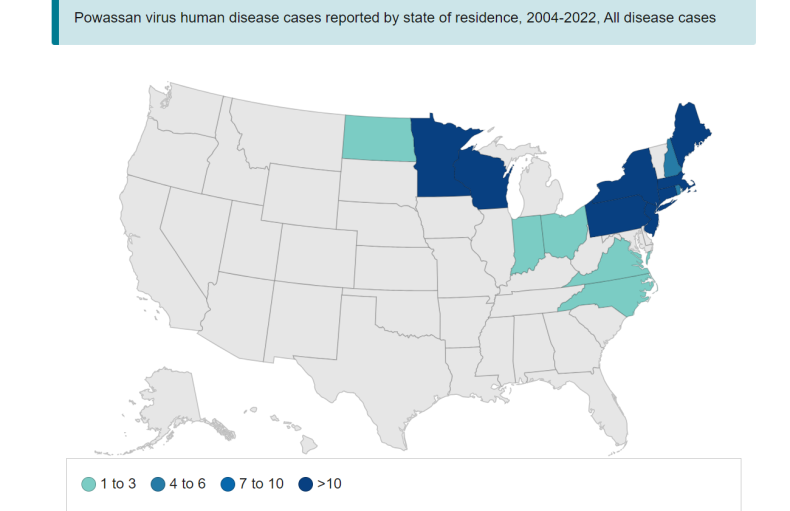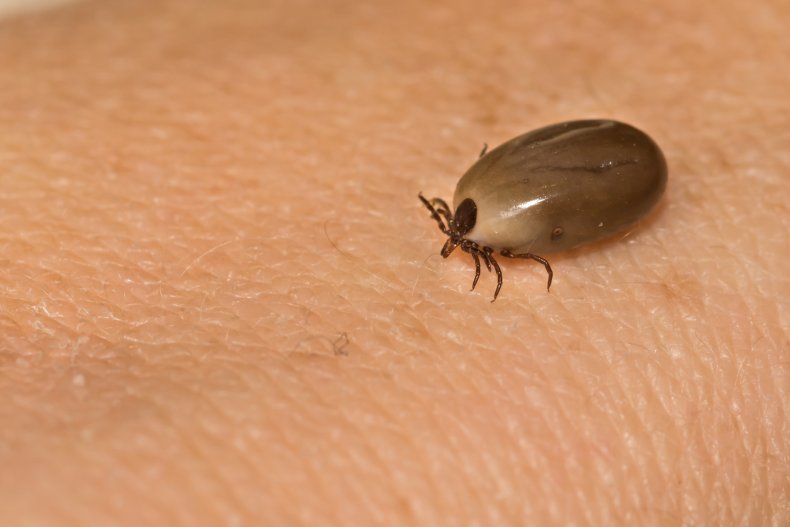A woman has died in Rhode Island after contracting a rare case of tick-borne Powassan virus disease.
The 80-year-old woman died in mid-July after developing neurological symptoms, with lab testing from the Centers for Disease Control and Prevention (CDC) confirming she had the virus, a statement from the Rhode Island Department of Health (RIDOH) said.
This marks the second death from the virus this year so far, and one of only six cases seen in Rhode Island since 2013.
The disease is caused by the Powassan virus, which is transmitted via tick bites. These ticks, usually the blacklegged (deer) tick, are mostly found in the United States northeast and Great Lakes regions, with most cases occurring during the summer months, when ticks are most active.

The ticks themselves catch the virus from their rodent host. The virus cannot be transmitted between humans, except via extremely rare incidences of blood transfusion.
The first death from the virus in 2023 was reported in May after a 58-year-old man from Maine passed away.
There have been 11 other cases recorded by the CDC in 2023 so far, with one in Minnesota, one in Pennsylvania, two in New York, three in Maine, three in Massachusetts and one in New Hampshire. Last year saw 43 cases country-wide, while 2021 and 2020 reported 21 and 24 cases, respectively.
Between 2013 and 2022, 288 cases in total have been recorded across the United States, resulting in 264 hospitalizations and 36 deaths.
"Powassan cases are rare, but the reported number of cases has increased in recent years. Between 2013 and 2022, there were 93 cases of Powassan reported in New England: 49 cases in Massachusetts, 18 cases in Connecticut, 16 cases in Maine, five cases in New Hampshire, and five cases in Rhode Island," the RIDOH said in the statement.

Many people with the virus do not suffer any symptoms, but for those who do, symptoms of the virus include fever, headache, vomiting, weakness, confusion, seizures, or memory loss, due to encephalitis or inflammation of the brain.
"Most people who are infected have no symptoms and fully recover," Daniel Pastula, an associate professor of neurology, infectious diseases and epidemiology at the University of Colorado School of Medicine, previously told Newsweek. "A subset, within one to four weeks develop a pretty bad flu-like illness. And a subset of those people develop Powassan neuroinvasive disease. That's where we are seeing the severity."
About 10 percent of people who are severely sick with the disease die, while around half experience long-term health problems, such as recurring headaches, loss of muscle mass and strength, and memory problems.
There is no vaccine or treatment for Powassan, so preventing exposure to ticks is the best strategy to avoid the disease.

"Recreational, occupational and residential habits make it difficult to avoid tick exposure for most people living in endemic areas," Peter Krause, a senior research scientist in epidemiology at Yale School of Public Health and Yale School of Medicine, previously told Newsweek. "Ticks are often present in grassy areas and in leaf litter on personal property and can attach during even brief exposure. Use of repellents is very helpful in preventing tick bites."
Wearing long sleeves and pants in grassy areas can prevent ticks from attaching to the skin.
"The repellent DEET [N,N-diethyl-m-toluamide, or N,N-diethyl-3-methylbenzamide] is the most effective," Krause said. "Permethrin is a highly effective acaricide that can provide additional protection. Permethrin repellent can be applied to, or impregnated in, clothing and shoes."
To prevent any ticks from flying under the radar, check your body for the tiny critters after coming back inside, and take a shower just in case.
"Tick checks under bright lighting should be performed at the end of each day of exposure," Krause said. "Use of a washcloth or tweezers with special attention to armpit, groin, back and scalp areas may dislodge attached and unattached ticks," Krause added.
"A tick should be removed with an ordinary pair of thin-tipped tweezers or forceps. The tick should be grasped by the mouth end and gently pulled straight upward."
Do you have a tip on a science story that Newsweek should be covering? Do you have a question about Powassan virus disease? Let us know via science@newsweek.com.








